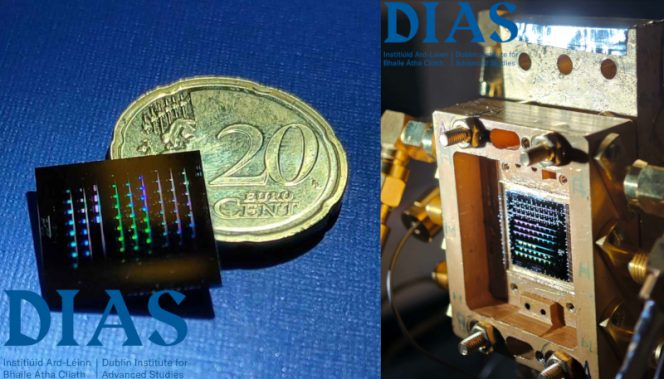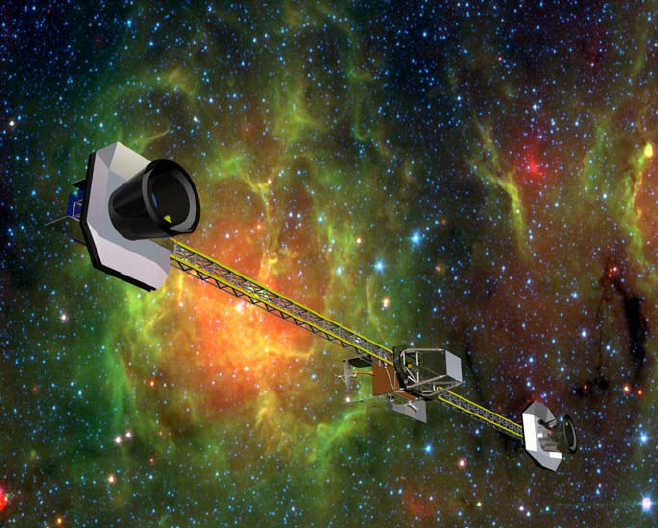MKIDS Detector Development
Dr Colm Bracken’s group works on instrumentation for astronomy, astrophysics, and cosmology. This group's research has two main branches: 1) The development of novel low-temperature superconducting detector arrays, and 2) Optical and quasioptical design and simulation of far infrared telescope systems and interferometers.
Superconducting MKID Detector Arrays for Optical/Near-IR Astronomy and Astrophysics
The microwave kinetic inductance detector (MKID) is a relatively new class of detector technology, based on superconducting thin films and the associated kinetic inductance effect. These revolutionary superconducting detectors will allow astronomers to get past some of the fundamental limitations of semiconductor devices (CCDs). MKIDs offer significant improvements in sensitivity and time resolution, while allowing spatio-spectral imaging and without the need for dispersive optics and the corresponding reduction in signal throughput. Because the superconducting bandgap can be orders of magnitude smaller than the semiconductor bandgap, MKIDs allow single-photon-counting at optical/near-infrared wavelengths, with moderate energy-resolving power. MKIDs can also be employed for detection of wavelengths into the far-infrared and sub-mm bands.
The group, in collaboration with DIAS (Dublin Institute for Advanced Studies) are focussing on development of novel Ti/TiN/Ti tri-layer materials for our MKIDs. We can tailor the critical temperature of these materials (usually to roughly 800 mK) by varying the thicknesses of the three layers of the Ti/TiN/Ti samples. We are also developing novel frequency-division multiplexing readout electronics, which allows micro-second time resolution for each pixel simultaneously - important for many astrophysical science targets. Our ultimate goal is to commission an MKID-based instrument on a large telescope in the near future, and we will target ambitious science goals such as direct imaging and atmospheric characterisation of Earth-like exoplanets.
This research is supported by a grant from Science Foundation Ireland under the Frontiers for the Future program (SFI grant number: 21/FFP-P/10213). This research build upon a previous research grant from Science Foundation Ireland: (SFI Grant number 15/IA/2880).
https://www.dias.ie/2016/07/07/3rd-august-dias-to-develop-revolutionary-new-detector-for-astronomy

Double-Fourier Interferometry for Far-Infrared Astronomy and Astrophysics
Achieving sub-arcsecond spatial resolution at long wavelengths (low energies) is very difficult to achieve with single-mirror telescopes, as the telescope size scales directly with wavelength for a desired resolution. The challenge becomes particularly difficult for far-infrared wavelengths, since space-based telescopes are typically required due to extreme atmospheric attenuation of the light across much of the far-IR bands. A solution to this scaling issue is interferometry, where two or more telescopes are used together to synthesise a larger aperture by increasing the separation between the telescopes. When this spatial Fourier interferometry is combined with spectral Fourier techniques (such as Fourier transform spectrometry), the technique is called double-Fourier interferometry. Dr Bracken's group are involved in system design, modelling, and electromagnetic simulation for these double-Fourier systems. Although no space-based interferometer has yet been realised, it is inevitable for the future if astronomers desire sub-arcsecond spatial resolution across the science-rich far-IR wavebands. The group have been involved in a number of proposed double-Fourier space missions, as well as a three-year technological critical assessment funded under the European Commission's FP7 program:
https://cordis.europa.eu/project/id/312818/reporting
https://www.ucl.ac.uk/~ucapgsa/fp7-ko.htm
https://asd.gsfc.nasa.gov/spice/

Staff:
Postdoctoral researchers:
- Gerhard Ulbricht
Postgraduate students:
- Cathal McAleer
- Gary Buggy Donegan
